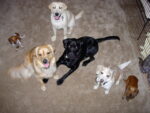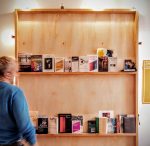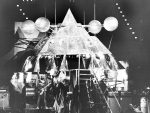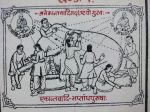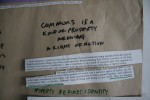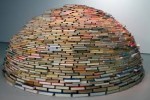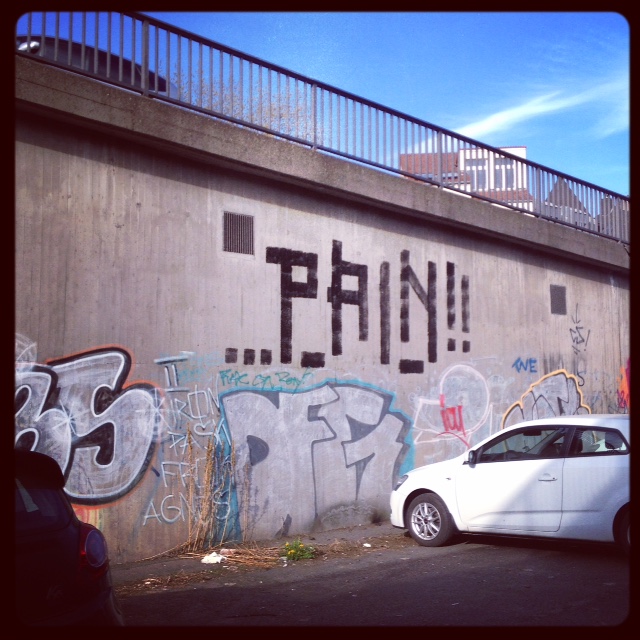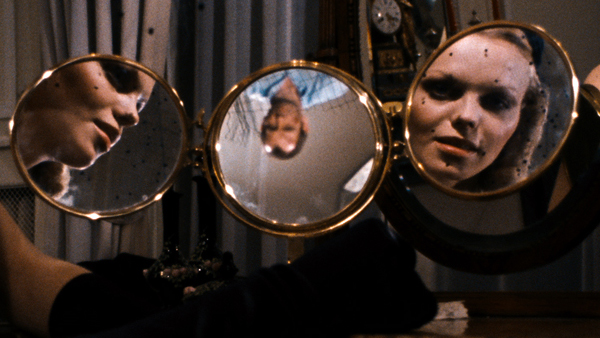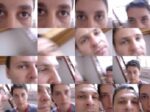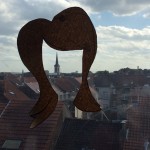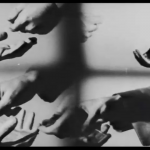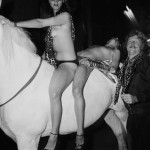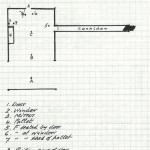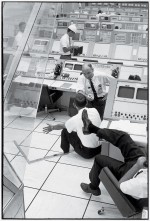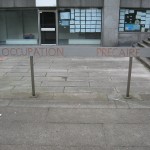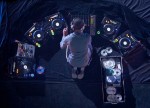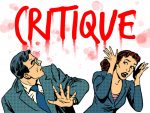PROGRAM AND SCHEDULE
This block is organized around a series of Study Days. Almost every Monday till the end of November, a.pass hosts artists, thinkers and researchers to contribute to the problematization of various issues that bring together love, art, school, improvisation and politics.
** The texts bellow are written from the perspective of the notions explored at a.pass, and not by the guests, who are invited to respond to them from within their own practices **
September 10th
Maybe one day, love will no longer be considered a private endeavor or a slogan of hippies, but rather a public and a political mode of being...
Guests: Johan Grimonprez & Bleri Lleshi
Imagine a society that bases its arrangements, institutions and democracy on love itself. Such a society will probably teach and exercise love as a force that contributes to the constitution of communities. Maybe then it will make less sense to say that love is a social construction than to say that love constructs society... What kind of practices can re-appropriate love by allowing it to shift from individual, consumerist and patriarchal inclinations into the political engagement of play and interaction of differences? How can love be romantic but not only? What if love would expend beyond the limits of the couple and the nuclear family and serve as the basis for our political projects in common?
10h – 13h A session with Johan Grimonprez
13h – 14h Lunch
14h – 15h15 presentation of work by Johan Grimonprez
15h15 – 15h30 Break
15h30 – 18h A session with Bleri Leshi
September 17th
To be included your love tool kit
Or: Tender technologies: how tools shape practice and practice shapes tools
Guest: Femke Snelting
Femke Snelting: Can we transform our relation to everyday communication technologies? Can we take that risk? Currently, tech giants dominate all forms of digital communication, from cloud-storage to production tools and archiving systems. Infused with modernist ideas of progress, these tools are full of capitalist values and dreams of seamless scaleability. They form intricate webs of human and non-human agencies weaving themselves into and around us, intimately linking our personal and professional practices. Also institutional practice has come to rely on the use of commercial platforms, including places that are dedicated to radical transformation, political love and commoning like a.pass. So how are we being with technology when practicing a School of Love? This study-day is dedicated to experiencing technology differently, of developing a convivial relationship that foregrounds vulnerability, mutual dependency and care-taking. With the help of old and new Free, Libre and Open Source Software tools we will practice a transition from anticipating efficiency to allowing curiosity; from expecting scarcity to demanding multiplicity; from solution to possibility.
10h – 13h A session with Femke Snelting
13h – 14h Lunch
14h – 18h A session with Femke Snelting
September 24th – September 29th
Inspired by the interest in both love and school as charged with potential to generate new politics and relations in the world.
a.pass meets SOL participates to The Swamp School at the Venice Biennale Architecture 2018
"In exploring the imaginary of a swamp—a living organism in which borders defined by social, political and cultural factors are porous and permeable— the Swamp School will investigate an open artistic/architectural form, effective workshop and publication methodologies. The Swamp School will act as a pilot for future learning environments, informed by and informing the architecture and installations of its own space. Research questions will focus on creating public interfaces and manuals that support adaptation and learning to meet the demands of a changing environment.” Swamp Pavillion curated by Nomeda and Gedeminas Urbonas.
Participating institutions: MIT School of Architecture and Planning, Royal Academy of Fine Arts Antwerp, University of Antwerp, Università Iuav di Venezia, Nuova Accademia di Belle Arti - NABA Milan, The Art Institute at the Academy of Art and Design FHNW Basel, Institute of Aesthetic Practice and Theory IAeP, Academy of Art and Design FHNW Basel, University of Iceland, Vytautas Magnus University Kaunas, a.pass - advanced performance and scenography studies Brussels, Vilnius Gediminas Technical University, Contour Biennale 9 Mechelen, Design for the Living World Class at HFBK The University of Fine Arts Hamburg, Städelschule Architecture Class – Staatliche Hochschule für Bildende Künste Frankfurt
http://swamp.lt/#program
October 8th
Blame it on monogamy
Guests: Eva Berghman, CW/the Common Wallet project, Kathrien De Graeve
Many of us were indoctrinated to believe that they desire only one way of moving through the course of life, where pairing is the ultimate goal and the preferable mode of being. This probably has not much to do with the belief in the mental and spiritual profoundness of the unit of two, but rather being motivated by the fear of being left out by a society that socially and economically prioritises the couple. How to re-appropriate institutions that re-appropriated love itself by bounding it to laws, contracts, economy and morals? What if being polyamorous would not only mean having many lovers, but many kinds of love? We could chose to stop considering Polyamory as merely a sexual and romantic practice, and think of it as an ethic that potentially destabilizes the normative hierarchies between human relationships. Monogamy is not just a way to love romantically, it also influences our relations to money, time, jobs, passports, artistic/scientific/academic researches etc... If Polyamory would be the dominant way of relation in the political and social sphere, how would this effect the notions of owning (property, identity, ideas) and owing, of secrets and privacy? How can love subvert and de-construct power structures that use monogamy to move us away from caring collectively?
10h – 11h30 A session with Katrien De Graeve
11h30 – 13h A Session with Eva Berghmans
13h – 14h Lunch
14h – 15h30 A session with CW / the Common Wallet project
15h30 – 16h Break
16h – 18h A discussion through relating the themes of the day to our own practices
October 22nd
Love makes schools make love
Guests: Jan Masschelein, Laurence Rassel, SRG / school research group
Maybe one day, schools will no longer be considered as merely a protective incubator that prepares one to life outside of it, but rather an engaged environment that influences the world. Think of a society that bases its schools on experiment, reflection and collectivity, independent from the market's need. Schools that produce ideologies and policies, instead of being instrumentalised by them. Schools that gather strangers and differences under the common wish to study public matters in order to challenge and improve them. If ever such a society will exist, it will probably construct its schools as flexible systems that work in acceptance of potential change and disruption, as a way to embody that which is being studied in them. Can schools embrace love as a strategy to create a place of encounter where both the institution and its part takers grow in relation to each other? How can a school base its structure on the same principals it wishes to teach?
13h – 16h A session with Jan Masschelein
16h– 18h A session with Laurence Rassel
18h – 19h Dinner (provided by a.pass)
19h – 21h Presentation of school models that were developed by a.pass participants
October 29th
By putting that which is between us before that which we think belongs to us.
Guests: Caroline Godart, Elke Van Campenhout
School is maybe more of a verb than a noun. Its a state of “attentivnes” to the world that one could chose to enter at any time and any place, in the company of others. Within this logic, wouldn't being a student similar to being an artist? Schools and students could be considered as lovers, who commit to each other, but do not wish to control what the other does with the love that they give. To school could mean to study and care for the same thing that you would also be willing to let go of. To - engage with, and - detach from, at the same time. This could be the love that dares to bound spirituality and politics together. If school becomes a verb, teachers would then teach how to school, and maybe love would not be a feeling, but a mode of studying that generates feelings.
10h – 13h A reading session with Caroline Godart
13h – 14h Lunch
14h – 16h A reading session with Caroline Godart
16h – 16h30 Break
16h30 – 18h A reading session with Elke Van Campenhout
October 31st – Nov 5th (Nov 3rd – off)
Instead of needing to know
A workshop by Joao Fiadeiro.
Guests: Elke Van Campenhout, Alex Arteaga
If in both Love and School an openness to change through encounters with others is practiced, we better develop sensitivities to deal with a change into an unknown path. Perhaps we would be better off improvising through, with and within the unknown instead of needing to know. Maybe improvisation today can be approached as a mode of resistance to tendencies for a life dedicated to an anticipated and defined future. It might seem like stating the obvious, proposing to put improvisation back in the agenda. Life itself is an improvisation, of course, we never stopped improvising. But we can dedicate a special attention to it in order to examine its relevance to nowadays realities. Not the improvisation that aims to emancipate repressed self expressions, neither the one that provides skills and masteries to manoeuvre within individual lives and careers , but an improvisation attitude that may create an actualized set of relations between us and other people, us and other things, us and anything that is not us.
10h – 18h A workshop with Joao Fiadeiro
19h – 21h (Nov 2nd, 4th, 5th ) Evening interventions by Joao Fiadeiro, Elke Van Campenhout, Alex Arteaga
November 12th
The Love workers
Guests: An Mertens, Daniela Bershan
Artistic processes often face the contradiction of critiquing the same protocols they have to comply with, such as deadlines, saleable products, authorship, commissions and competition. Many artists experience frustration by the fact that policy makers, programmers and curators determine the visibility of certain artists/art works instead of others. A Love Worker – could this be a synonym for an Artist? Would this emancipate some practices from having to defend their relevance through the procedures imposed by artistic scenes? Or better than that – could this expand the boundaries of what an artistic work can become?
10h – 13h A session with An Mertens (in the forest)
13h – 15h Lunch (+ coming back from the forest)
15h – 18h A session with Daniela Bershan
BIOGRAPHIES
Bleri Lleshi is philosopher, writer, lecturer, youth worker and DJ. He studied political sciences and philosophy at Vrije Universiteit Brussel. At the moment he is writing a ph.d on the struggle of the excluded. Lleshi is lecturer at UCLL where he teaches various subjects on social sciences. His research focuses on topics such as inequality, neoliberalism, youth, migration, identities, and extremism. Lleshi has participated in conferences, debates and media. In 2014, he was considered as one of the most influential immigrants in Belgium
Johan Grimonprez’s critically acclaimed work dances on the borders of practice and theory, art and cinema, documentary and fiction, demanding a double take on the part of the viewer. Informed by an archeology of present-day media, his work seeks out the tension between the intimate and the bigger picture of globalization. It questions our contemporary sublime, one framed by a fear industry that has infected political and social dialogue. By suggesting new narratives through which to tell a story, his work emphasizes a multiplicity of realities. Grimonprez's curatorial projects, films and installations have been exhibited at museums worldwide. He published several books and he lectures widely.
Femke Snelting works as artist and designer, developing projects at the intersection of design, feminism and free software. In various constellations she explores how digital tools and practices might co-construct each other. She is member of Constant, a non-profit, artist-run association for art and media based in Brussels. Since 1997, Constant generates performative publishing, curatorial processes, poetic software, experimental research and educational prototypes in local and international contexts. http://constantvzw.org/
Eva Berghmans is a journalist working for 'De Standaard'. As a journalist she has an excuse to step up to people and ask them all kind of weird and intimate questions. She never took 'because this is the way we have always done things' for an answer and tries to see through the presumptions in our everyday lives. Currently she is working on a research project on polyamory, published on http://www.standaard.be/tag/.'
CW/the Common Wallet project is an initiative of 10 people from the art sector in Belgium who share their individual income in one collective bank account. Through this experiment they collectively explore their psychological and cultural dependencies on money and a possible alternative to the monogamous and often lonely relationship one has with the money one earns. CW part takers are : Luigi Coppola, Eliza Demarre, Anna Rispoli, Adva Zakai, Diederik Peeters, Christophe Meierhans, Luca Mattei, Agnes Quackels, Ingrid Vranken, Irena Ramanovic
Katrien De Graeve is a postdoctoral researcher of the Research Foundation Flanders (FWO), affiliated to the Department of Languages and Cultures of Ghent University, and member of the Centre for Research on Culture and Gender. In 2012, she completed her PhD at the Department of Comparative Sciences of Culture at Ghent University with a critical analysis of intensive parenting practices in Belgian-Ethiopian adoptive families. In her current research project (2016-2019), she has shifted focus to the study of sexuality/romantic relationships and discourses of exclusivity and plurality in light of the normative two-parent nuclear family.
Jan Masschelein is head of the Laboratory for Education and Society, and of the research group Education, Culture and Society. He studied educational sciences and philosophy at the K.U.Leuven and at the Johan Wolfgang Goethe Universität in Frankfurt am Main and is as well Fellow of the Alexander Von Humboldt-Stiftung. His research can be situated in the broad domain of the formation of educational theory, critical theory, social philosophy and governmentality studies. More concretely it concerns the public and societal role of education and schooling, the role of the university, the changing experiences of time and space in the age of the network, the educational meaning of cinema and camera, the architecture of schools and architecture of the learning environment, a pedagogy of attention, the notion of 'pedagogy', the pedagogical role of teachers and social workers. A lot of attention is directed towards experimental educational practices and towards new forms of documentary and exploratory research.
Laurence Rassel is currently the director of art school ERG in Brussels. Educated in visual arts and pedagogy, she pursued an interdisciplinary trajectory from new media to the management of an artistic institution. From 2010 to the end of June 2015, she was director of the Fundacio Antoni Tàpies in Barcelona, a foundation created to promote contemporary art and thought, and the study of Antoni Tàpies' work. Previously, from 1998, she was, among others, responsible for Constant, a non-profit organization based in Brussels. Constant connects theoretical thinking, the critical use of new technologies, artistic behavior and political issues in the network. At the same time, she was project coordinator for the Interface3 women's technology training center in Brussels, as part of the European ADA project from 2001 to 2006.
SRG/School Research Group is an open group of art practitioners and pedagogues who meet regularly in order to share their interest and experience within school environments in Belgium and study together.
Caroline Godart is a writer, professor and dramaturge based in Brussels. She holds a PhD in Comparative Literature with a concentration in Cinema Studies from Rutgers University (USA), where she studied with Elizabeth Grosz. She is now an Assistant Professor of Communication, Germanic Languages and Cultural Studies at IHECS (Institut des Hautes Études des Communications Sociales, Brussels). Her first book, The Dimensions of Difference, was published by Rowman and Littlefield in 2016. It explores the question of difference, and in particular of sexual difference, through three axes (space, time, and embodiment), which are approached both as aesthetic devices and as philosophical concepts in the works of Luce Irigaray, Gilles Deleuze and Henri Bergson.
Elke Van Campenhout / ELLE is a tantric practioner and artistic researcher. She developed her work partly at the a.pass research institute where she worked for five years under the umbrella of Bureau d’Espoir, a practice on the import, export and redistribution of hope. For this practice she studied political theory, contemporary philosophy and spiritual body practices. Her work is a transdisciplinary practice, linking contemporary philosophy to spiritual body practice, in the development of an ethics of coming together and rethinking our relation to the world we live in. Since 2 years Elke Van Campenhout and Stijn Smeets started up the experimental living community The Monastery, dedicating all their time and resources on the creation of a spiritual life of devotion, alternative economies, and ritual composition.
João Fiadeiro belongs to a generation of choreographers who emerged in the late 1980’s and led to the emergence of the Nova Dança Portuguesa. In 1990, he founded the workshop RE.AL Company that supported the creation and dissemination of several choreographers and their works, which were regularly performed in Europe, the United States, Canada, Australia and South America. Real Time Composition is a project that he has been developing for twenty years. In parallel, he has organized several workshops in various training courses, schools and universities throughout the world. João Fiadeiro is currently completing a PhD in contemporary art at the University of Coimbra in Portugal.
Alex Arteaga’s research integrates aesthetic and philosophical practices relating to aesthetics, the emergence of sense, meaning and knowledge, and the relationships between aurality, architecture and the environment through phenomenological and enactivist approaches. He studied composition, music theory, piano, electroacoustic music, and architecture in Berlin and Barcelona and received a PhD in philosophy from the Humboldt University for his dissertation Sensuous Framing: Fundamentals of a Strategy to Realize Conditions of Perception. From 2008 to 2012 he was a post-doctoral researcher at the Collegium for the Advanced Study of Picture Act and Embodiment at the Humboldt University and visiting professor at the MA Choreography at the Inter- University Centre for Dance Berlin. In 2012 he led the research team at the Berlin.
An Mertens is artist, writer, and core-member of Constant, an artist run organisation for experimental art and media in Brussels. Next to a practise of literary creation using algorithms, she is also a nature guide in Forêt de Soignes and writing fiction with a particular interest for the non-human presences in woods.
http://constantvzw.org, http://www.algolit.net, http://www.paramoulipist.be/
Daniela Bershan aka Baba Electronica is a love worker using visual arts, performance, music making and social organization around topics of collective study, care-making and practices of (non-sexual) intimacy. In her work she conceptualizes not just the characteristics of her materials but with and through them the skills and objects they can be read with: the DJ, the remixer, the researcher, the love-worker are dissecting choreographies and scores in order to make tangible how they operate; and enable to organize relations otherwise. They are committed to experiment and circulate with queering tools. Bershan co-founded and directed FATFORM (NL), and is co-organizing ELSEWHERE & OTHERWISE at Performing Arts Forum (FR). Her works, projects and performances have been presented worldwide.
